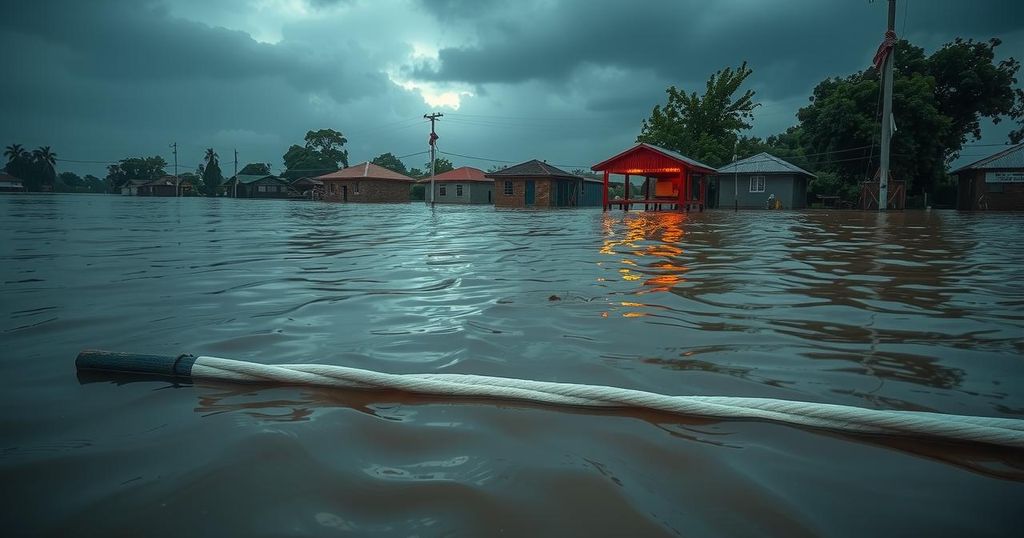Severe Flooding in South Sudan Heightens Health Crises and Humanitarian Challenges

South Sudan is experiencing devastating flooding that has displaced over 226,000 individuals and impacted health services across 42 counties. The floods are exacerbating an already dire health crisis, with the WHO responding by providing emergency health supplies to affected communities. Climate change continues to worsen these flooding incidents, threatening public health and infrastructure as the country grapples with the influx of refugees from armed conflict in neighboring Sudan.
Severe flooding in South Sudan has resulted in some of the most devastating impacts the nation has experienced in decades, affecting over 226,000 individuals and displacing many communities. This natural disaster has particularly impacted 42 of the country’s 78 counties, with reports indicating that 58 health facilities have been submerged, and nearly 90 additional facilities are currently inaccessible. Key transport routes, including primary roads leading to the capital city of Juba, have been cut off, impeding access to vital health services. As of October 4, 2024, approximately 890,000 people residing in flood-stricken areas have experienced adverse effects. While heavy rains are common from April to November during South Sudan’s rainy season, the intensity of these floods has been exacerbated by climate change, further stretching the resilience of the affected communities. The situation is further complicated by the presence of nearly 800,000 refugees and returnees from neighboring Sudan who have fled due to armed conflicts. The floods have heightened existing health vulnerabilities in the country. Instances of cholera have already been detected in Renk County, along with a marked increase in malaria cases, which totaled over 120,000, resulting in 31 suspected fatalities as of September 29, 2024. Reports indicate 55 snake bite incidents over a five-week period, underscoring the critical health crisis. Dr. Humphrey Karamagi, the World Health Organization (WHO) Representative in South Sudan, stated, “People are in a heightened state of vulnerability due to multiple shocks. WHO is committed to work with the Ministry of Health and our partners to ensure that they have access to essential health services continue while also prioritizing the response to growing humanitarian and health needs.” In response to the calamity, the WHO has distributed approximately 88 metric tonnes of emergency health supplies to various impacted counties, which can treat over 870,000 individuals. This includes essential medical items such as cholera investigation and treatment kits and antimalarial medications. Moreover, the WHO has prepositioned additional health kits and rapid diagnostic tests specifically for cholera and malaria support. The Organization is diligently collaborating with the Ministry of Health to enhance emergency health responses, conducting rapid assessments, and equipping local health workers with necessary training. WHO also aims to protect health facilities from further damage and facilitate the movement of essential medical supplies to safer locations. Continuous monitoring of health impacts attributable to the floods is being conducted, focusing on vector-borne and water-borne diseases. Furthermore, WHO is advocating for measures to create climate-resilient health systems across Africa, recognizing climate change as a fundamental threat to public health. This involves establishing robust frameworks for effective action against health challenges resulting from climate change, emphasizing the need for scientific evidence-driven adaptations to health systems, and seeks sustainable investments for resilience building.
The humanitarian crisis in South Sudan has escalated due to the compounded effects of severe flooding and ongoing armed conflict in the region. Historically vulnerable to climate-related disasters, South Sudan faces increasing challenges as the severity of flooding increases, linked closely to climate change. The country’s infrastructure, such as health facilities and roads, is under immense pressure, leading to significant public health risks, particularly in flood-affected areas. Additionally, the influx of refugees exacerbates an already delicate humanitarian situation, raising concerns regarding disease outbreaks and access to healthcare.
In summary, the severe flooding in South Sudan has had catastrophic effects on health and infrastructure, displacing hundreds of thousands and increasing the prevalence of infectious diseases and other health-related crises. The World Health Organization, in partnership with local health authorities, is actively engaged in addressing these pressing health needs and ensuring access to crucial health services. The growing impact of climate change intensifies the need for resilient public health systems to better prepare for and respond to such emergencies. The ongoing efforts to support affected communities, including distribution of emergency health supplies and monitoring of health conditions, highlight the urgent response required in addressing the health challenges posed by this flooding crisis, particularly amidst an ongoing humanitarian situation involving numerous refugees.
Original Source: www.afro.who.int







